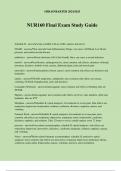©BRAINBARTER 2024/2025
NUR160 Final Exam Study Guide
Schedule II - answer✔script available with no refills; opiates and ativan
NSAID - answer✔Non-steroidal Anti-Inflammatory Drugs; can cause a GI Bleed, Low blood
pressure, and cardiovascular disease
antibiotics - answer✔treat infections; kill of the friendly flora; can cause a second infection
timolol - answer✔beta blocker; antihypertensive; most common side effects: shortness of breath,
insomnia, dizziness, double vision, nausea, abdominal pain, joint and muscle pain
tamoxifen - answer✔antineoplastic (breast cancer); most common side effects are dizziness and
headaches
aspirin - answer✔NSAID; antipyretic; antiplatelet; most common side effects are nausea,
vomiting, GI bleed, hypoglycemia, rash, and dizziness
Coumadin (Warfarin) - answer✔anticoagulant; most common side effect is bleeding; labs are
PT/INR
Heparin - answer✔anticoagulant; most common side effects are fever, rash, diarrhea, chills and
headache. labs are PTT
Morphine - answer✔Schedule II; opiod analgesic; for moderate to severe pain. Side effects are
respiratory depression, bradycardia, sedation, confusion, dizziness, euphoria, nausea, and
vomiting
Fentanyl Patch - answer✔Schedule II; opiod analgesic; for moderate to severe pain; most
common side effects are respiratory depression, respiratory arrest, bradycardia, confusion,
dizziness, euphoria, and sedation. Take 12 hours to set in; usually replace every 72 hours
percocet - answer✔oxycodone aceteminophen; schedule II; opiod analgesic; side effects are
respiratory depression, drowsiness, dizziness,, confusion, headache, sedation, euphoria, nausea,
and vomiting.
Norco - answer✔Hydrocodone bitartrate acetaminophen; schedule II; antitussive opiod
analgesic; most common side effects are drowsiness, respiratoy depression, pulmonary edema,
confusion, tachycardia, bradycardia, nausea, vomiting, anorexia, and constipation.
, ©BRAINBARTER 2024/2025
What is the max dose for tylenol? - answer✔4g or 4000mg per day
Tylenol - answer✔acetaminophen; antipyretic; for mild to moderate pain; most common side
effects are nausea, vomiting, abdominal pain, seizures, renal failure, and liver damage.
Flomax - answer✔Alpha blocker; used for BPH; for both men and women; most common side
effects are low BP, dizziness, headache and decrease libido
Proscar - answer✔hormone, androgen inhibitor. ONLY FOR MEN. Women should avoid
handling unless wearing gloves. Most common side effects are impotence, decreased libido, and
sexual dysfunction
Fosamax - answer✔bone-reabsorption inhibitor. prevents the breakdown of bones. take by
mouth, can cause esophageal irritation. always take on an empty stomach, with a full glass of
water and in high fowlers position for 30 mins
albuterol - answer✔bronchodialator, is used for bronchoconstriction, inflammation, and
increased secretions. considered the "rescue inhaler" most common side effects are tremors,
anxiety, restlessness, tachycardia, and irritability
lopressor - answer✔metoprolol beta blocker; lowers BP and HR. always check both before
administering. most common side effects are shortness of breath, cold hands and feet, insomnia,
fatigue, and depression
What do blood thinners have in common? - answer✔the all thin the blood
What is the main side effect of blood thinners? - answer✔bleeding and black tarry stools
What are black box warnings? - answer✔Serious health hazards if medication is misused
Which pain medication is used for mild to moderate pain? - answer✔tylenol
What schedule are opiates? - answer✔Schedule II
What is the most common side effect of opiates? - answer✔respiratory depression
What medication immediate helps shortness of breath? - answer✔Albuterol
What does prednisone do? - answer✔treats inflammation
What medication can cause a potassium imbalance? - answer✔lasix
What is a normal pH? - answer✔7.35-7.45
What are the normal levels for PCO2? - answer✔35-45 mmHg
What are the normal HCO3 levels? - answer✔22-26 mEq/L




